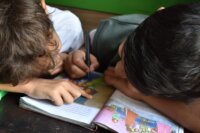Dr. King: The revolution is where you are

I walked the chip aisle of Trader Joe’s for dill pickle and blue corn tortilla chips. Out of the corner of my eye, I saw a kerfuffle and turned to witness a white woman in her sixties escalating a conversation with a black man. We were at the height of the pandemic, and putting two and two together, he’d asked her to put on a mask. She was the only one in the store without one.
The woman stepped within an inch from his face and began to scream and curse at him, eyes vicious and filled with hatred. He stood firm without moving but never threatened her. I asked another shopper to get security and stepped between them, asking the woman to stop. That’s when she shouted, slow and purposeful, “You’re not even a man!”
“Shut up! Shut up!” I yelled louder now. “Look at me! Look at me!” Her demonic episode halted for a second when she finally noticed me standing in front of her. “He is a MAN. STOP IT.” Hawaiian shirts flooded the aisle and pulled the woman and her cart back from the man.
“Are you okay?” I asked him. “I am so sorry.”
He nodded. “I’m fine,” he said as he walked out of the store, never once dropping his chin. My heart pounded in my ears, and I felt enraged at the racist woman. Her lack of self-control, her entitlement to not follow the rules, and her bitter venom created an unforgettable moment in man’s life. And mine.
In 1968, Dr. Martin Luther King Jr. joined the Sanitation Workers’ Strike in Memphis, Tennessee. On February 12, 1,300 black workers who were underpaid and working in dangerous conditions decided to strike after two men were crushed to death by their garbage truck while working.
Clergy, civil rights leaders, and community members helped organize marches during the strike, but the Memphis mayor, Henry Loeb, did not support them. Workers lost all pay during the strike, and police sprayed mace and tear gas and killed a 16-year-old boy named Larry Payne during one of the marches.
In April, King marched with the workers and the community, many carrying signs that said, “I am a man,” demanding their dignity and humanity to be acknowledged and respected. He gave a speech on April 3, 1968, the day before his death, and you’ve likely heard or watched him preach these words:
“Well, I don’t know what will happen now. We’ve got some difficult days ahead. But it doesn’t matter to me now. Because I’ve been to the mountaintop. And I don’t mind. Like anybody, I would like to live a long life. Longevity has its place. But I’m not concerned about that now. I just want to do God’s will. And he’s allowed me to go up to the mountain. And I’ve looked over. And I’ve seen the promised land. I may not get there with you. But I want you to know tonight, that we, as a people, will get to the promised land. And I’m happy tonight. I’m not worried about anything. I’m not fearing any man. Mine eyes have seen the glory of the coming of the Lord.”
He knew the threats were imminent. Now, he could stand together with the community in Memphis and see freedom come to another city in the beloved community of Christ. He’d already survived a stabbing from a demented woman at a book signing in Harlem and lived to see both the Civil Rights Act and the Voting Rights Act passed.
King encouraged, “… we’ve got to give ourselves to this struggle until the end. Nothing would be more tragic than to stop at this point, in Memphis. We’ve got to see it through. And when we have our march, you need to be there. Be concerned about your brother. You may not be on strike. But either we go up together, or we go down together. Let us develop a kind of dangerous unselfishness.”
He told the story about the Good Samaritan, masterfully teaching theological theories about why the Levite and the priest didn’t stop to help the man dying in a ditch. He explained his experience with Coretta traveling the winding and dangerous Jericho Road, where people walking would be vulnerable to attackers. In the days of Jesus, it came to be known as ”The Bloody Pass.” King imagines the two men may have been too scared to stop. He poses:
“So, the first question that the Levite asked was, f I stop to help this man, what will happen to me?’ But then the Good Samaritan came by. And he reversed the question: ’If I do not stop to help this man, what will happen to him?’
That’s the question before you tonight. Not, ’If I stop to help the sanitation workers, what will happen to all of the hours that I usually spend in my office every day and every week as a pastor?’ The question is not, ’If I stop to help this man in need, what will happen to me?’ ’If I do not stop to help the sanitation workers, what will happen to them?’ That’s the question.
Let us rise up tonight with a greater readiness. Let us stand with a greater determination. And let us move on in these powerful days, these days of challenge to make America what it ought to be. We have an opportunity to make America a better nation.”
I remember feeling baffled but not surprised at the woman shouting, “You’re not even a man!” to the gentle giant at Trader Joe’s. I remember how he never moved his body, not even as her spit landed on his face. I remember how he refused to drop his eyes from hers, and I felt the strength in him as he resisted her attack. It didn’t feel like his first time. I am a man, he said implicitly with all the nonviolent power within him.
King’s invitation to us remains: to remember our brother, remember our sister, and engage our responsibility to one another. I will never know what it’s like to be hated for the color of my skin, but I will remember that God calls me to love. I will remember that what happens to another made in his image happens to me. We are bound together in love.
Love will not bow to fear, nor will it tolerate hatred kindly. Love develops a dangerous unselfishness, pushing past “If I stop to help, what will happen to me?” into “If I do not stop to help, what will happen to them?”
You might struggle to know your place in the social issues of our day—you’re not alone. We are tired, going to work, raising babies, dealing with relational struggles, and doing our best to survive. But an opportunity will come in the middle of an ordinary day while you are working, grocery shopping, or going on your way. May you rise, ready to intervene, determined to love because you are concerned about your sister, your brother, your neighbor. Do not stand idly by. Do not let love pass you over.
The revolution is where you are. Together we can build a better world.
Consider a few extra resources:
- How do we teach our children to
- Teaching kids to love their neighbor
- Raising generous kids who see others







